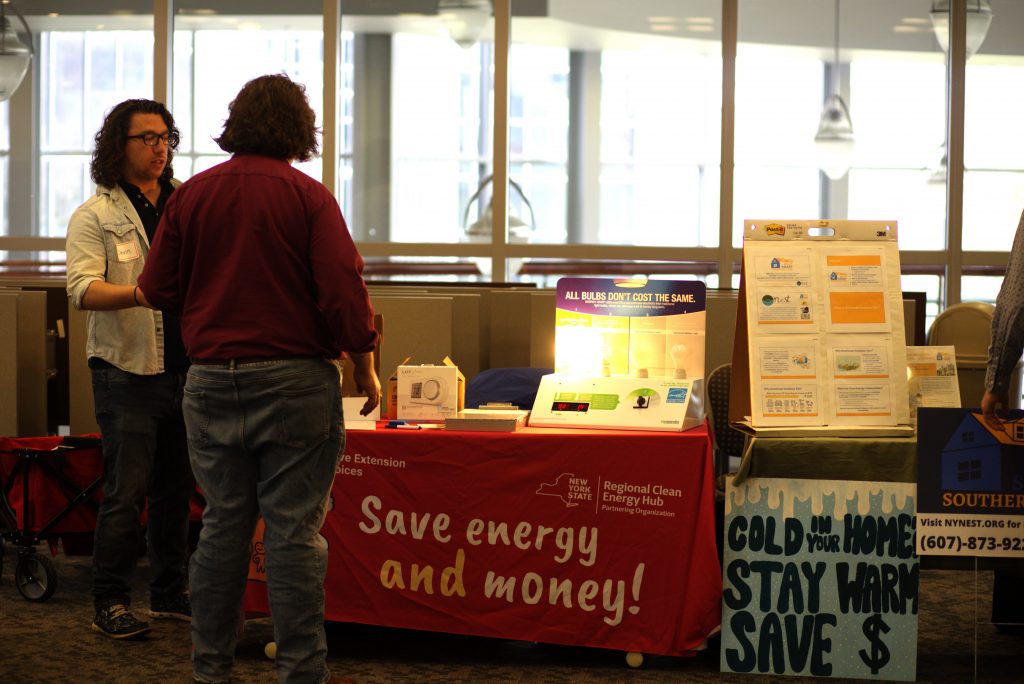A local climate change summit was held this past weekend to highlight ways in which Broome County can become more environmentally sustainable.
Spearheaded by Binghamton University, Broome County Planning, the American Red Cross, United Way of Broome County and Southern Tier 8, the summit spanned April 26-27 in the Health Sciences Building in Johnson City and the Innovative Technologies Complex. On its first day, individual organizations in the area that received targeted invitations — including municipalities, nonprofit organizations and for-profit, private organizations — gathered to develop climate change action or adaptation plans. The second day of the summit was open to the community, educating and offering interactive activities for attendees.
“If people have an understanding of what’s happening and have an idea of how they can interact with organizations or what they can do in their day-to-day lives, it’s more likely for them to actually take action to reduce climate change impacts or to mitigate or prepare themselves for it,” Martin Larocca, a University sustainability manager, said. “Because if you are just telling people ‘climate change is happening, here is the science,’ it may bounce off. They may accept it [or] just move on.”
The first day began with Jeff Smith, the president and co-founder of Tier Energy Network, providing an overview of the impacts of climate change on Broome County. In the talk, Smith emphasized the successes achieved with technology, tourism and education and areas that can be improved upon. Following the talk, attendees chose between three simultaneous panels based on their interests — Infrastructure & Resiliency, Food Insecurity & Agriculture and Health and Society. The afternoon’s structure mirrored the morning’s, with a focus on Energy, Refugees & Social Services and Housing.
Gillian Sloan, a planner with the Broome County Planning and Economic Development department and the coordinator of the Sustainable Broome Initiative, said the event included local governments, organizations, professors, students and community members who all wanted to better understand climate change and become involved locally.
“This event, in my opinion, has aided in the already present push toward action planning for climate change, sustainability [and resilience] in our region,” Sloan wrote. “There are many other initiatives working independently of one another, but now, I believe we will all understand that working together and [collaborating] will have a larger positive effect on making true change.”
The summit’s second day began with a climate simulation exercise using En-ROADS, an online simulator that explores climate solutions across different sectors. Attendees then had the opportunity to speak with presenters to learn more about their organizations and topics like climate anxiety, energy and waste management.
Some groups presenting at the summit included Network for Sustainable Tomorrow, the Cornell Cooperative Extension, Binghamton 2 Degrees, the United Way of Broome County and Church in the Wild.
Alyssa Weber, a 1MReady ambassador and a junior double-majoring in geography and environmental studies, said the 1MReady campaign encourages students to monitor their carbon footprint — ultimately contributing to the larger fight against climate change on an individual scale.
“We want to institute what’s basically a culture change,” Weber said. “Once we get individuals involved and aware of their carbon footprint, we’re thinking that they’ll actively try to fight climate change. Once everybody is on board with that, they’ll be able to support bigger movements like legislation changes and contacting their local representatives. We’re basically starting from the ground up.”
Speaking with attendees about her work with children and senior citizens, Kira Hawes, a recycling and composting educator, discussed her experience managing a community compost site at the Cornell Cooperative Extension — spotlighting her efforts to fill the composting gap in Broome County.
Pam Mischen, the University’s chief sustainability officer, said the event contributed to a larger effort to make climate change more “pressing and present.” She offered different activities to attendees to learn more about their food choices, where their food comes from and the carbon emitted as a result of their food choices.
“We’re trying to get the word out to students that you’re primed, you understand climate change is happening, but also that you have a responsibility to try to keep it from being the worst-case scenario,” Mischen said. “And there are so many things you can do.”



